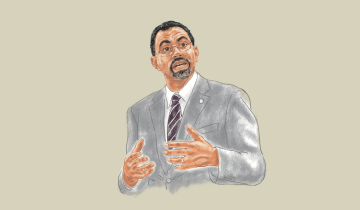The way Brent Warner MAT ’12 sees it, Nov. 30, 2022, will go down as a watershed moment for educators. That’s the day OpenAI launched ChatGPT. The release of the user-friendly generative AI technology set off a frenzy, with 100 million monthly active users joining the fold by January 2023. It also resulted in consternation—and even calls for bans—among many educators, concerned about the potential for students to short-circuit learning by using the powerful new tool to pass off essays and other work as their own.
Warner isn’t among the naysayers. As an associate professor and co-chair of English as a Second Language at Irvine Valley College (IVC), a community college in Irvine, California, he has long seen the value of bringing innovative technology applications to his students. A graduate of USC Rossier’s Master of Arts in Teaching–Teaching English to Speakers of Other Languages (online) program, Warner shares his ed-tech insights as a co-host of The DIESOL Podcast (Developing Innovation in ESOL) and The Higher EdTech Podcast, as well as on blogs for TESOL.org.
And yet, as he began to grasp the potential impact of ChatGPT and its competitors, even Warner found himself uncertain over what to make of the game-changing development.
“We’re never going to live in the same world again,” he says. “But it’s tricky to predict how it will be different, because there’s so much to sort out.”
Warner’s interest in teaching English to speakers of other languages has roots in his own student experience. As an undergraduate, he double-majored in Pacific Asian studies and Japanese, and while learning a second language he developed an admiration for the impact his teachers had.
After graduating from San Diego State University, he moved to Japan, where he taught English and became passionate about pursuing a career teaching ESOL.
He sees technology as an especially potent tool for ESOL. “I always tell my students that ESOL is not a goal, but a bridge to the goal,” Warner says. “Technology can help to create a sense of autonomy for them, so that they don’t always have to wait for the teacher to give them the feedback. It helps them to take control of their own learning, which is empowering.”
When he decided to pursue his master’s, Warner recalls, USC Rossier’s MAT-TESOL program was the obvious choice. “It was one of the first schools that had a synchronous online environment, and I viewed that as the future of teaching,” he says. “I found it to be the perfect combination of a program that was forward-thinking in terms of where the online experience was headed, but also recognized the need for humanity and the importance of the personal relationship between the teacher and student.”
At IVC, Warner is not only given the freedom to experiment with innovative adaptations of ed tech, but he also guides colleagues seeking advice on how to make the best use of ed tech. Warner led an effort to devote the first unit of the academic writing course to understanding AI, while also introducing it into his courses. As his students read Ray Bradbury’s Fahrenheit 451, Warner had them use AI image generation through Canva, an online design platform, as a way to reflect on the story. Warner also prompted his students to choose a character from the book and, using ChatGPT, engage in a conversation with the book’s characters.
As co-chair of IVC’s Online Education Committee, Warner has been at the forefront of institutional discussions about AI’s place in the college’s classrooms. He has advocated against the use of ChatGPT-detection software, arguing that it is unreliable and easily bypassed—and that false positives are harmful to students. “Building student relationships is going to be far more important so that they can find a passion for what they’re learning, rather than playing cat and mouse with plagiarism software,” he says.
While much of the discussion around AI in education has focused on fears about plagiarism and other forms of cheating, Warner is embracing the transformative technology.
“These are early days, and if we make good decisions, we can guide this in ways that will help students with their learning,” he says. “But teachers will need to have conversations with their students where they decide together what they want and need to learn, then make the necessary adjustments to ensure the highest chance of success.”




